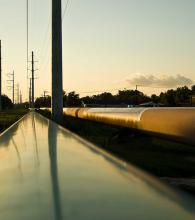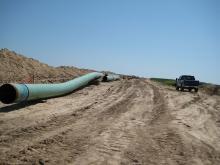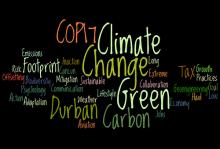Environmental Stewardship

Late Wedesday (1/18), leaders from Christian and other faith communities welcomed the news that the Obama administration has rejected the construction of the Keystone XL pipeline.
The controversial project, which would have run for 1,700 miles from Alberta, Canada, through the American Heartland to the Gulf of Mexico, would have been a backward step in the administration’s professed commitment to investing in clean and renewable energy sources.
In August 2011, more than 1,200 peaceful protestors were arrested as part of a sustained campaign to demonstrate against the pipeline project. In November 2011, Sojourners CEO Jim Wallis, along with other Sojourners staffers and 15,000 members of the public, peacefully (and prayerfully) encircled the White House to urge President Obama to stop the project.
Sojourners welcomed the Obama’s decision in November to postpone the permitting of the pipeline until an environmental impact report was completed. While this new decision is a clear step forward, TransCanada has the opportunity to reapply for the permit along a different route and leaders have pledged to remain vigilant and watch the issue closely.

The building of a 1,700-mile pipeline through the heartland of the United States has been at the center of the debate on the economy for many months now. Much has been written by those who both support and oppose its construction. And much has also been written about just how important the pipeline would be to the U.S. economy if it were actually to be built.
With the deadline for the Obama administration’s decision on construction coming up fast (2/21), many have already made up their minds. But have they done so on the basis of accurate figures?
It might be pretty difficult to do so, given that various estimates put the number of jobs created though the construction of the pipeline at anywhere between 20 and 350,000. So where have all these different estimates come from, and which one (if any) is actually accurate?
The first difficulty that arises from trying to find an accurate estimate is that most of the numbers from the upper echelons of the estimates come from the company who are hoping to build the pipeline: TransCanada.

The legacy of Martin Luther King, Jr., and the reality of climate change are both victims of western culture’s remarkable capacity to accommodate and neutralize that which is most critical of it.
Early in the civil rights movement, Bayard Rustin said to King, “I have a feeling that the Lord had laid his hand upon you. And that is a dangerous, dangerous thing.” Similarly, the FBI once described Martin King as the “most dangerous man in America” – and yet, as Martin Luther King Jr day rolls around again in the United States, we are often presented with a figure that seems more like a cheerleader for the status quo rather than a prophetic challenge to it. Somehow, it seems we have made this dangerous figure very safe.
For instance, in a speech at the Pentagon commemorating King’s legacy, the Defense Department’s general counsel Jeh C. Johnson remarked, “I believe that if Dr King were alive today, he would recognize that we live in a complicated world, and that our nation’s military should not and cannot lay down its arms and leave the American people vulnerable to terrorist attack.”
But to claim that Dr King would be pro-war today is as likely as him being pro-segregation. After all, this is the Dr King who said, “A nation that continues year after year to spend more money on military defence than on programs of social uplift is approaching spiritual death.” And this is the same Dr King who said in his speech on 4 April 1967 (a speech that turned three quarters of American public opinion against him), “To me the relationship of the ministry [of Jesus Christ] to the making of peace is so obvious that I sometimes marvel at those who ask me why I’m speaking against the war.” And this is the same Dr King who said, the night before he was murdered on 4 April 1968, “It is no longer a choice, my friends, between violence and nonviolence. It is either nonviolence or nonexistence.”

Climate change affects the poorest the hardest. Most things do. In the parts of the world where climate change is most prevalent, it is those who have done the least to cause it that are bearing the brunt of its effects.
It is the Malawian farmer whose crops have failed because the seasonal rains didn’t start at the usual time. It’s a Bangladeshi who can see the sea-levels rising around her town year after year, and has nowhere to go. It’s even an American family whose food bill grows ever larger because of the stresses that a changing climate is having on food security worldwide.
These are neither the people nor the organizations that have spent decades turning a blind eye to their responsibility as good stewards of our environment. They are not the people who, in the face of more and more extreme weather patterns, turn an issue of human survival into an ideological war.
It is for them that we must adapt.

Indigenous communities -- and local church leaders -- stand against open-pit mining that threatens to despoil Patagonia.
"I think it is a spiritual task to struggle with questions such as what and who we place at the center of our economy"

After years of opposition from coal industry lobbyists, the Environmental Protection Agency has issued the first national standards for mercury and air toxin pollution.
The standards will slash emissions of these dangerous pollutants by relying on widely available, proven pollution controls that are already in use at more than half of the nation’s coal-fired power plants.
The EPA estimates that the new safeguards will prevent as many as 11,000 premature deaths and 4,700 heart attacks each year. The standards also will help America’s children grow up healthier — preventing 130,000 cases of childhood asthma and about 6,300 fewer cases of acute bronchitis among children each year.

After two weeks of extensive talking, and running hours beyond schedule, a deal to cut global carbon emissions finally has been reached. As the climate conference in Durban, South Africa came to a close last weekend, a treaty known as the Durban Platform emerged, requiring all countries to begin curbing carbon emissions by 2020.
The deal binds all countries — rich and poor — to “hold the increase in global average temperature below 2C or 1.5C above pre-industrial levels,” according to the Framework Convention on Climate Change. Further, plans for enhanced action must be solidified by 2015, with the contracts bearing legal force.
Michael Jacobs, a member of the of the Grantham Research Institute on Climate Change and the Environment in London, told the BBC that " by forcing countries for the first time to admit that their current policies are inadequate and must be strengthened by 2015, it has snatched 2C from the jaws of impossibility. At the same time it has re-established the principle that climate change should be tackled through international law, not national, voluntarism.”
But the treaty has its drawbacks.
While citizens across the United States have been demanding President Obama deny the permit for the Keystone XL pipeline, Canadians and First Nations folks have been organizing as well.
One question I’ve been asked repeatedly during the Tar Sands organizing is: “If we stop the mining and oil company from building a pipeline from Alberta to Texas, won’t they just a build one from Alberta to the Pacific and ship the oil to China?”
The companies were only too happy to have us buy their logic. But the truth was that our job in the U.S. was to keep the pipeline out of our backyard, and trust that the Canadian movement would do the same. Well, it turns out they have. First Nations folks pledged to block construction with their bodies and widespread public concern has forced the Harper government to review environmental concerns.
The real work has been done for years by indigenous leaders on both sides of the border.

It didn’t take long — after news broke this afternoon that President Obama had indefinitely kyboshed the climate-killer Keystone XL pipeline — for my phone to ring.
“Hi Rose, I’m calling from White House on behalf of President Obama," the voice on the other end of the line said. "We wanted to makes sure you’d seen the president’s executive order postponing the permitting of the pipeline until another environmental impact report can be done, especially focusing on sensitive environmental issues in Nebraska.
"And we want to thank you for your good work on this issue. We’re just reaching out to let you know that the President hears you and we hope you’ll continue to help us focus on the really critical issues that are facing us right now.”
This afternoon President Obama made an official announcement on the Keystone XL Pipeline that so many of you have been working on these last several months.
President’s Obama’s delay in approving the Keystone XL Pipeline is a victory for the movement to stop it, for God’s earth, for the possibility of reversing climate change, and for saving the integrity of this administration.
A “No” to pipeline approval wasn’t really politically likely, with the likelihood of attacks on Obama by the Republicans and the labor movement of sacrificing jobs during an election year — even though the pipeline offers temporary and bad jobs.
The environmental movement is part of the Democratic President’s base, but so is labor and they are both more numerous and more effectively organized to help in presidential races.
So this delay is a victory for the possible future of a clean energy economy, which would produce many more and better jobs, while making a cleaner and more sustainable economy possible.
In a statement released by the White House this afternoon, President Obama said in part:
Because this permit decision could affect the health and safety of the American people as well as the environment, and because a number of concerns have been raised through a public process, we should take the time to ensure that all questions are properly addressed and all the potential impacts are properly understood.
Looking at reality TV’s latest sensation: All American Muslim, stories of Missouri's Chocolate University harvesting more than cocoa beans, exploring the terms behind the latest anti-bullying legislation, Bill McKibben, social media meets religion, God and sports, Proposition 8, and more.

I always notice something when speaking to a mostly secular audience. Many people have been so hurt or rejected by the bad religion in which they were raised or have encountered elsewhere over the course of their lives, and, quite understandably, they are skeptical and wary of the faith community. But when someone looks like a faith leader (this is where the ecclesial robe helps ) and says things that are different from what they expect or are used to, their response is one of gratitude and the moment becomes an opportunity for healing.
After I spoke Sunday and joined the circle around the White House, person after person came up to me to express their thanks or simply to talk.
My favorite comment of the day came from a woman who quietly whispered in my ear, "You make me almost want to be a Christian."

This Sunday (11/6), is precisely one year from the 2012 General Election where the next U.S. President will be elected, and to mark the date, thousands of people from across the country plan to gather at the White House.
But we're not gathering to celebrate, have a sit-in, or even march in protest. Instead, we plan to surround the White House -- literally -- in a Circle of Hope that could be as large as a mile or more in circumference.
From our Circle of Hope we will call upon President Obama to reject the dirty-oil, Keystone XL pipeline Big Oil wants to build from the Canadian tar sands in the Alberta province 6,000 miles south -- straight through the American Heartland -- to the oil refineries along the Gulf Coast of Texas.
On November 6, I will join Jim Wallis, staff members from Sojourners, and 15,000 others in Washington, D.C.'s Lafayette Park to tell President Obama to stop the Keystone XL pipeline project.
If approved by the Obama administration, the pipeline would transport non-conventional tar sands oil from Alberta, Canada, 1,700 miles south -- through the American Heartland -- to the oil refineries in Texas on the Gulf of Mexico.
The high cost of anti-immigration laws. Why candidates' faith matters. ABC News' exclusive interview with President Obama. U.S. Hispanics choosing churches outside Catholicism. Three U.S. Congressmen tour the Canadian tar sands. Who are the death penalty's most ardent supporters? Investors worth a collective $20 trillion (with a T!) call for urgent action on climate change. And God's economy.
Sojourners Associate Editor Rose Marie Berger addresses hundreds gathered near Freedom Plaza in Washington, D.C. last week, to protest the Keystone XL oil pipeline.